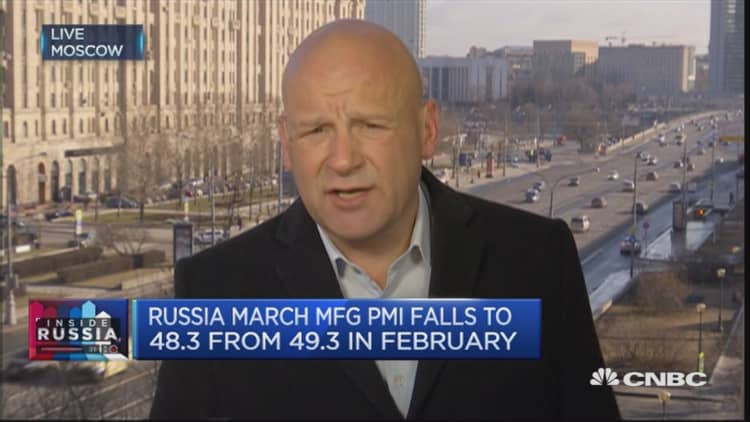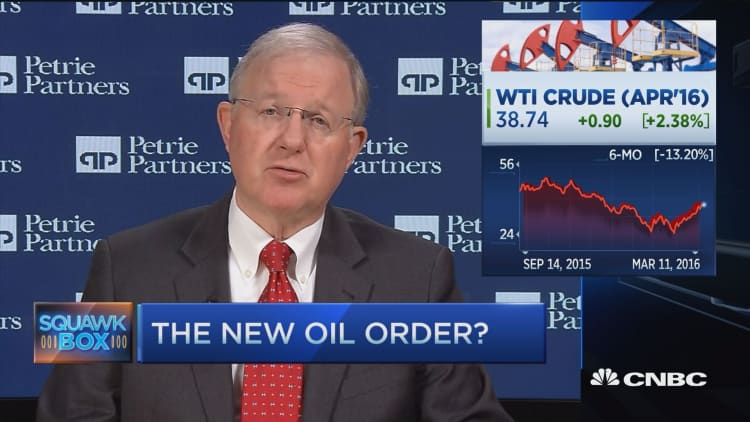




Any hope of a coordinated output freeze between leading oil producers and an end to the recent sharp swings in the commodity's price are likely to be dashed, one expert has told CNBC.
"I think the prospect of a tangible production freeze (in April) is minimal. I think the fact that they're actually talking about one is a thing that the markets will jump on," Simon Fentham-Fletcher, CIO at Freedom Asset Management, told CNBC Monday.
"Russia will not and has never held to any production freezes ever and I can't see it doing so now. The Saudis are in the same situation, they've been trying to grab market share and we have Iran coming back online, they were very unsure about the levels of the Iranian oil production," Fentham-Fletcher added.
Leading OPEC and non-OPEC producers are expected to meet in Doha on April 17 to discuss a solution to oil's current supply glut. However recent comments made by leading OPEC members have suppressed many analysts' hopes of a potential cut or freeze this month.
Oil fluctuated on Monday, with prices coming under renewed pressure around 2 pm U.K. time, with Brent and US crude trading at $38.46 and $36.70 respectively. Prices have been volatile after oil minister Bijan Zanganeh, said Iran would continue increasing production and exports until it reached a favorable market position, similar to one seen before its sanctions period, according to reports.
Remarks made by Saudi Arabia last week also weighed on investor sentiment, after it said it wouldn't join any efforts to fix current conditions, unless Iran was also on board, Reuters reported.
Private banking group Julius Baer said on Monday that while talk about Doha grabs market attention, the prospect of orchestrated supply cuts remained "dim."
"Most petro-nations are starving for cash and the incentives are set to produce more rather than less, not least as Iran returns to the market claiming its historic share of the export pie," Norbert Ruecker, head of commodity research at Julius Baer, said in a note.
For some, while Russia and Saudi Arabia remain influential, Iran's return to the international oil scene has become the key catalyst.
"(Iran) doesn't want to agree to any kind of limit (following its sanctions relief) and without that, it's hard to see others in the group feeling like a production freeze is really going to work," Richard Mallinson, geopolitical analyst at Energy Aspects, told CNBC Friday.
"If they can get some kind of commitment out of Iran, or even if Iran is just not being overly unhelpful, maybe they do go ahead to try and give some positive messages to the market," Mallinson added.
Fentham-Fletcher, meanwhile, added that while sanctions were "definitely hurting" the Russian economy; the oil price remained the main influence, as many hope sanctions would ease off later this year.
"The saving grace for Russia is that in ruble terms the oil price decline isn't so extreme but we've seen oil rebound substantially since the lows of mid-February. However, oil in the mid-$30s is doing Russia no favors whatsoever. And indeed it's doing nobody any favors whatsoever."
"FX reserves in the Middle East will run dry as quickly as the desert sand if it keeps on like this, so I expect in the medium term, I'd expect cost to rise back to the marginal cost, which is more in the $45 to $50 a barrel range."
While Russia has shown interest in an agreement with other producers, recent Energy Ministry data revealed the country's oil production hit its highest in almost 30 years in March, with production rising 0.3 percent to some 10.91 million barrels a day. Despite this data, Russia's energy minister said that it wouldn't get in the way of an agreement on a production freeze, according to Reuters.
While a potential cut or freeze in output still remains unclear for April, Fentham-Fletcher saw the discussion between leading producers as a sign that a freeze would "eventually" happen.
"But the fact that there's absolute talk of one, means that eventually one will come and a production freeze will eventually happen. At the moment just the talk of it is good for the oil price."
—Reuters contributed to this report.






